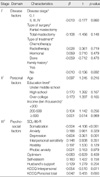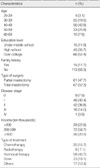1. Fann JR, Thomas-Rich AM, Katon WJ, Cowley D, Pepping M, McGregor BA, et al. Major depression after breast cancer: a review of epidemiology and treatment. Gen Hosp Psychiatry. 2008. 30:112–126.

2. Korean Institute for Health and Social Affairs. Korea Regional Center for Health and Social Policy. 2006. Seoul: Korean Institute for Health and Social Affairs.
3. Wildes KA, Miller AR, de Majors SS, Ramirez AG. The religiosity/spirituality of Latina breast cancer survivors and influence on health-related quality of life. Psychooncology. 2009. 18:831–840.

4. Institute of Medicine. From Cancer Patients to Cancer Survivor: Lost in Transition. 2006. Washington, DC: Institute of Medicine and the National Research Council, National Academics Press.
5. Knobf MT. Psychosocial responses in breast cancer survivors. Semin Oncol Nurs. 2007. 23:71–83.

6. Suh YO. Predictors of quality of life in women with breast cancer. J Korean Acad Nurs. 2007. 37:459–466.

7. Jo KH. The relationship among personality, hope and quality of life of breast cancer patients. J Korean Acad Soc Nurs Educ. 2004. 10:115–124.
8. Shim JH, Park KS. A study on quality of life of those who have breast cancer patients taking chemotherapy. J Korean Acad Adult Nurs. 2004. 16:49–59.
9. Avis NE, Crawford S, Manuel J. Quality of life among younger women with breast cancer. J Clin Oncol. 2005. 23:3322–3330.

10. So WK, Marsh G, Ling WM, Leung FY, Lo JC, Yeung M, et al. Anxiety, depression and quality of life among Chinese breast cancer patients during adjuvant therapy. Eur J Oncol Nurs. 2010. 14:17–22.

11. Arndt V, Stegmaier C, Ziegler H, Brenner H. Quality of life over 5 years in women with breast cancer after breast-conserving therapy versus mastectomy: a population-based study. J Cancer Res Clin Oncol. 2008. 134:1311–1318.

12. Whelan TJ, Levine M, Julian J, Kirkbride P, Skingley P. The effects of radiation therapy on quality of life of women with breast carcinoma: result of a randomized trial. Ontario Clinical Oncology Group. Cancer. 2000. 88:2260–2266.

13. Andritsch E, Dietmaier G, Hofmann G, Zloklikovits S, Samonigg H. Global quality of life and its potential predictors in breast cancer patients: an exploratory study. Support Care Cancer. 2007. 15:21–30.

14. Shapiro SL, Lopez AM, Schwartz GE, Bootzin R, Figueredo AJ, Braden CJ, et al. Quality of life and breast cancer: relationship to psychosocial variables. J Clin Psychol. 2001. 57:501–519.

15. Pedro LW. Quality of life for long-term survivors of cancer: influencing variables. Cancer Nurs. 2001. 24:1–11.
16. Carver CS, Smith RG, Petronis VM, Antoni MH. Quality of life among long-term survivors of breast cancer: different types of antecedents predict different classes of outcomes. Psychooncology. 2006. 15:749–758.

17. Yoo YS, Cho OH. Spouse support, sexual satisfaction and marital intimacy of post-mastectomy patients. J Korea Community Health Nurs Acad Soc. 2001. 15:148–156.
18. Engel GL. The need for a new medical model: a challenge for biomedicine. Science. 1977. 196:129–136.

19. Yun YH, Park Ys, Lee ES, Bang SM, Heo DS, Park SY, et al. Validation of the Korean version of the EORTC QLQ-C30. Qual Life Res. 2004. 13:863–868.

20. EORTC. EORTC-C30 Scoring Manual. 2001. 3rd ed. Brussels: EORTC.
21. Derogatis LR. SCL-90-R Manual I. 1977. Baltimore: Clinical Psychometrics Research Unit.
22. Kim KI, Kim JH, Won HT. Korean Manual of Symptom Checklist-90-Revision. 1984. Seoul: Chung Ang Aptitude Publishing Co..
23. Scheier MF, Carver CS. Optimism, coping, and health: assessment and implications of generalized outcome expectancies. Health Psychol. 1985. 4:219–247.

24. Park HS, Son JT. A study on the relationship between optimism and depression in chronic low-back pain patients. J Korean Acad Psychiatr Ment Health Nurs. 2001. 10:125–136.
25. Rosenberg M. Society and the Adolescent Self-Image. 1965. Princeton: Princeton University Press.
26. Jeon BJ. Self-esteem: a test of its measurability. Yonsei Nonchong. 1974. 11:109–129.
27. House JS. Work Stress and Social Support. 1981. Massachusette: Addison-Wesley.
28. Kim JN, Kwon JH. The efficacy of group psychotherapy for breast cancer patients: a preliminary study. Korean J Clin Psychol. 2005. 24:1–17.
29. Moorey S, Frampton M, Greer S. The Cancer Coping Questionnaire: a self-rating scale for measuring the impact of adjuvant psychological therapy on coping behavior. Psychooncology. 2003. 12:331–344.

30. Kim JN, Kwon JH, Kim SY, Yu BH, Hur JW. Validation of Korean Cancer Coping Questionnaire (K-CCQ). Korean J Health Psychol. 2004. 9:395–414.






 PDF
PDF ePub
ePub Citation
Citation Print
Print






 XML Download
XML Download